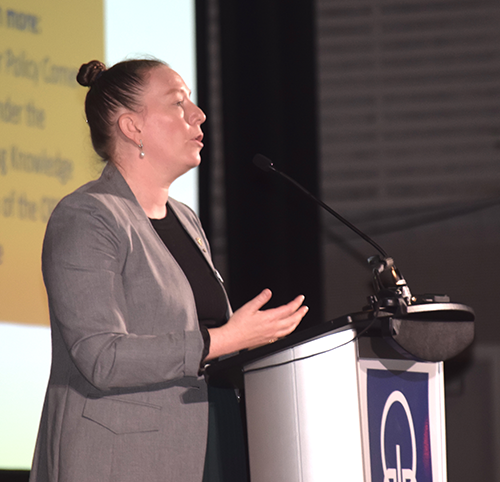Ontario’s professional planners recently gathered in Hamilton for their annual convention in the face of escalating challenges, with the imminent implementation of the province’s new Provincial Planning Statement top among their concerns.
The new policy takes effect on Oct. 20, replacing the Provincial Policy Statement, 2020 and A Place to Grow: Growth Plan for the Greater Golden Horseshoe, 2019.
Ontario Professional Planners Institute (OPPI) council chair Claire Basinski told delegates attending a recent session the new policy puts additional pressure on planners.
“The significant changes from a provincial legislation perspective have a direct impact on the planning profession,” said Basinski in an interview. “Over the past year-and-a-half, there is this sense of urgency, of the targets, the timelines, the need for more efficiency, greater streamlining, compounded by the fact that we are experiencing a shortage of planners across Ontario.
“Doing more, faster, with sometimes less, has really weighed heavily on our membership…this was a time of reconnection, an opportunity to be with your colleagues and other professionals who are experiencing similar things, maybe in different ways, with different pressures.”
Other recent legislation directly affecting planners includes the More Homes, More Choice Act and the More Homes Built Faster Act.
The session on the provincial policy statement was hosted by Denise Baker, co-managing partner at WeirFoulds, with Basinski giving an introduction. The presenters spoke on day two of the four-day OPPI conference.
OPPI focused on PPS implementation
Baker explained former growth plan policies now apply province-wide. There is also a more targeted focus on promoting development and intensification within major transit station areas.
The policy statement, prepared with significant input from the OPPI, Basinski noted, clearly reflects the Doug Ford government’s focus on building more homes.

“Sometimes I think it may sound as though we are just receiving and having to adapt to these legislative changes,” said Basinski. “I can assure you that while maybe not all of our desired changes are reflected in some of those new legislative documents, we are very much at the table having those conversations, and very much a partner as we can with the province.”
An example is the removal of third-party appeals, she said. OPPI members provided comments and criticism but now will focus on implementation of the new rules.
The OPPI membership is very broad, she noted, with 5,000-plus members coming from the public, private, institutional, not-for-profit and other sectors, and so the convention serves as an opportunity to examine the impacts of new policies on different facets of its membership.
“That is something that I think is a really wonderful thing about our profession,” said Basinski. “We provide our comments, we provide our input, we try as best as we can to be at the table, but once that legislation comes into effect, we work together to make sure we understand how to implement it.”
Another challenge for the profession, Basinski said, stems from the increasing breadth of the policy directions they are being asked to consider.
The convention agenda, with 95 sessions attended by 930 delegates in person with another 550 following online, contained elements of transportation, change management, environmental imperatives and heavily technical topics, among others, she pointed out.
“We have this very unique role, not only as technical experts, but as facilitators and as change makers, and that can, sometimes, be hard for others to grasp,” said Basinski. “How do you reconcile all of these different perspectives? But that is truly the skill set that many of these professionals and experts bring to the table.”
The OPPI released a wide-ranging set of policy statements at the Association of Municipalities of Ontario conference in August that recommends reforms to various processes including more timely and focused development approvals, more flexible policies, improving data and transparency, capacity building, and even urging the creation of a chief planner for Ontario.
In some cases, Basinski said, the recommendations are “leveraging tools that we already have in our toolbox and exploring how we can think of them a little bit differently in the context of meet the target of 1.5-million homes by a certain timeline and also general approvals processes.”
Follow the author on X/Twitter @DonWall_DCN.



Recent Comments
comments for this post are closed